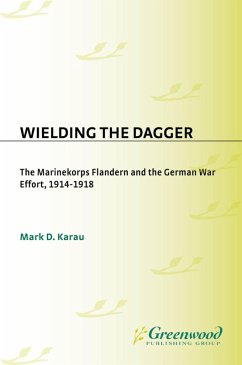In August 1914, Admiral Alfred von Tirpitz convinced the German armed forces to create a new unit, called the MarineDivision Flandern, to garrison the Belgian coastline and prepare naval bases in for the implementation of a naval guerrilla war against Great Britain. The Germans called their strategy Kleinkrieg, or little war, and they intended to whittle away at British naval superiority by using their submarines and destroyers. Later expanded into the MarineKorps, the unit soon found itself in the middle of a land war as well. What had been intended as a garrison unit found itself on the frontlines when the war stalemated.
The British had traditionally seen Belgium as a dagger pointed at the throat of England, and the Royal Navy feared what use the Germans might make of the position. The result was an active naval campaign in the English Channel. Karau brings to light the contributions of the MarineKorps Flandern, a force often neglected by historians. He examines the role of the MarineKorps in both land and naval wars and reaffirms the increasingly important role played by aircraft in the Flanders theater. If Belgium was a weapon pointed at the British throat, were the Germans properly equipped to wield the dagger?
The British had traditionally seen Belgium as a dagger pointed at the throat of England, and the Royal Navy feared what use the Germans might make of the position. The result was an active naval campaign in the English Channel. Karau brings to light the contributions of the MarineKorps Flandern, a force often neglected by historians. He examines the role of the MarineKorps in both land and naval wars and reaffirms the increasingly important role played by aircraft in the Flanders theater. If Belgium was a weapon pointed at the British throat, were the Germans properly equipped to wield the dagger?









